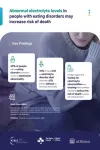(Press-News.org) Ottawa, ON, September 17, 2024 – A new study published in The Lancet Psychiatry found that 32% of individuals with an eating disorder had abnormal electrolyte levels, which were associated with a higher risk of death from any cause.
The study, led by researchers at ICES and The Ottawa Hospital, found that electrolyte abnormalities were also linked to the development of other serious health conditions, including chronic kidney disease, bone fracture, bowel obstruction, and acute kidney injury.
This is one of the first large, population-based studies to identify an important risk factor for mortality and poor health outcomes in individuals suffering from eating disorders. Electrolytes, such as potassium and sodium, can affect how the body functions. It's common to find that people with eating disorders have electrolyte abnormalities due to symptoms such as purging, the use of laxatives, and dehydration.
“These findings might inform explicit mention of electrolyte abnormalities in the criteria we use to assess the severity of eating disorders,” says lead author Dr. Marco Solmi, Medical Director of the Regional Eating Disorder Program at The Ottawa Hospital, and Director of research at the University of Ottawa’s Psychiatry Department.
The researchers included over 6,000 individuals 13 years of age and older who were diagnosed with an eating disorder and had an electrolyte level test within one year of their diagnosis, as recorded on a hospitalization or emergency department record in the province of Ontario, Canada.
Health outcomes and mortality
Analyzing health records between 2008 and 2019, the researchers found that:
Most people included in the study were diagnosed with an eating disorder not otherwise specified—disordered eating that falls outside the criteria for anorexia, bulimia and binge eating (59%) — followed by anorexia nervosa (22%) and bulimia nervosa (15%).
The mean age was 27 years, and 89% were female.
1,987 individuals (32%) had an electrolyte abnormality, and many had co-occurring health conditions.
Among those with an electrolyte disorder, 16% died compared to 6% in those without an electrolyte abnormality.
Electrolyte abnormalities were also associated with a higher risk of hospitalization and other serious health conditions, but not with a risk of infection or heart disease event.
“These findings underscore the importance of testing for electrolyte levels in people suffering from eating disorders, and then acting on those results to potentially reduce the risk of death or other severe outcomes,” says co-lead author Dr. Nicholas Fabiano, a psychiatry resident at The Ottawa Hospital and the University of Ottawa.
There is also a role for patient education and awareness. “Eating disorders are conditions that patients may often deny the existence of, or patients fail to appreciate the implications to their health. This study now shows that eating disorders which are severe enough to cause electrolyte disturbances have major ramifications in regard to long-term patient health outcomes,” says senior author Dr. Gregory Hundemer, adjunct scientist at ICES, nephrologist and Lorna Jocelyn Wood Chair for Kidney Research at The Ottawa Hospital, and assistant professor at the University of Ottawa.
Finally, the researchers suggest that the findings can help to redefine how clinicians score the severity of eating disorders, which is currently based on a patient’s body mass index and the frequency of behaviours like binge episodes. Electrolyte abnormalities may be found in patients who do not fit more typical eating disorder presentations and could ultimately help improve care for these patients and reduce their risk of death or other negative outcomes.
The article “Adverse outcomes and mortality in individuals with eating disorder-related electrolyte abnormalities: a population-based cohort study in Ontario, Canada” was published in The Lancet Psychiatry.
ICES is an independent, not-for-profit research and analytics institute that uses population-based health information to produce knowledge on a broad range of healthcare issues. ICES leads cutting-edge studies and analyses evaluating healthcare policy, delivery, and population outcomes. Our knowledge is highly regarded in Canada and abroad and is widely used by government, hospitals, planners, and practitioners to make decisions about healthcare delivery and to develop policy. For the latest ICES news, follow us on X, formerly Twitter: @ICESOntario
The Ottawa Hospital (TOH) is one of Canada’s top learning and research hospitals where we are guided by our vision to provide the world-class and compassionate care we would all want for our loved ones. Our multi-campus hospital, affiliated with the University of Ottawa, is home to the Regional Trauma Centre and Cancer Centre, and to discoveries that are adopted globally. Backed by generous support from the community, we are focused on reshaping the future of health care to improve the health of our diverse population of patients from Eastern Ontario, Western Quebec, and Nunavut. For more information about The Ottawa Hospital, visit OttawaHospital.on.ca.
The University of Ottawa is home to over 50,000 students, faculty and staff, who live, work and study in both French and English. Our campus is a crossroads of cultures and ideas, where bold minds come together to inspire game-changing ideas. We are one of Canada’s top 10 research universities—our professors and researchers explore new approaches to today’s challenges. One of a handful of Canadian universities ranked among the top 200 in the world, we attract exceptional thinkers and welcome diverse perspectives from across the globe. www.uottawa.ca
FOR FURTHER INFORMATION PLEASE CONTACT:
Misty Pratt
Senior Communications Associate, ICES
Misty.Pratt@ices.on.ca
343-961-6982
END
Abnormal electrolyte levels in people with eating disorders may increase risk of death, poor health outcomes
2024-09-17
ELSE PRESS RELEASES FROM THIS DATE:
No major concerns about risks to offspring for would-be dads taking epilepsy meds
2024-09-17
Would-be dads taking drugs to stop their epilepsy seizures—and valproate in particular—should be largely reassured that the available evidence on the developmental risks to their offspring doesn’t justify any major concerns, concludes a systematic review of relevant studies published online in the Journal of Neurology Neurosurgery & Psychiatry.
The available evidence is scarce and inconsistent, but most studies indicate no heightened risk, the findings show, casting doubt on the stance taken by the UK drugs regulator, the MHRA, in particular, say ...
Fifth of GPs using AI despite lack of guidance or clear work policies, UK survey suggests
2024-09-17
A fifth of family doctors (GPs) seem to have readily incorporated AI into their clinical practice, despite a lack of any formal guidance or clear work policies on the use of these tools, suggest the findings of an online UK-wide snapshot survey, published in the open access journal BMJ Health & Care Informatics.
Doctors and medical trainees need to be fully informed about the pros and cons of AI, especially because of the inherent risks of inaccuracies (‘hallucinations’), algorithmic biases, and the potential to compromise patient privacy, ...
Novel triplet regimen yields promising response in advanced-phase chronic myeloid leukemia
2024-09-17
HOUSTON ― According to researchers at The University of Texas MD Anderson Cancer Center, 80% of patients with previously untreated or relapsed/refractory advanced-phase chronic myeloid leukemia (CML) – including both accelerated or myeloid blast phases of the disease – or Philadelphia chromosome-positive acute myeloid leukemia (AML) achieved a bone marrow remission when treated with a novel combination of decitabine, venetoclax and ponatinib.
Findings from the Phase II clinical trial, published today in The Lancet Haematology, represent an important step forward for patients ...
‘Scuba-diving’ lizards use bubble to breathe underwater and avoid predators
2024-09-17
BINGHAMTON, N.Y. -- Presenting the world’s smallest (and scrappiest) scuba diver: A species of semi-aquatic lizard produces a special bubble over its nostrils to breathe underwater and avoid predators, according to new research from Binghamton University, State University of New York.
Lindsey Swerk, an assistant research professor of biological sciences at Binghamton University, studies water anoles, a type of semi-aquatic lizard found in the tropical forests of southern Costa Rica. She had previously documented the lizards using a bubble underwater. When these lizards feel threatened by a predator, ...
USC launches large-scale nationwide study of type 1 diabetes and brain development
2024-09-17
About half of adults with type 1 diabetes face significant cognitive impairment, including problems with working memory and executive function that affect day-to-day thinking. But less is known about how the condition affects children during a window of time known to be critical for healthy brain development.
A new large-scale longitudinal study, led by the Keck School of Medicine of USC, will unite 12 research centers across the United States to explore that important question. Researchers will collaborate to recruit a large, diverse group of children newly diagnosed with diabetes, taking a sweeping look at the environmental, lifestyle, ...
Ancestry-specific genetic variants linked to multiple sclerosis risk, new study shows
2024-09-17
A landmark study has uncovered novel ancestry-specific genetic variants linked to multiple sclerosis (MS), offering new insights that could reshape treatment approaches for diverse populations affected by the disease.1 The research, presented today at ECTRIMS 2024, is the result of efforts by the Alliance for Research in Hispanic MS (ARHMS) Consortium and is the first large-scale study to identify ancestry-specific genetic effects for MS risk.
In a comprehensive analysis of over 7,000 individuals from self-reported Hispanic (n=4,313; 2,201 MS, 2,112 controls) and African American (n=3,085; 1,584 MS, 1,501 controls) backgrounds, researchers discovered ...
Early high-efficacy treatment significantly reduces long-term disability in children with multiple sclerosis, new study finds
2024-09-17
New research presented today at ECTRIMS 2024 reveals that initiating monoclonal antibody therapy during childhood, rather than delaying treatment until early adulthood, significantly reduces long-term disability in multiple sclerosis (MS) patients.1
The study, which utilised data from the French MS Registry, Italian MS Register, and the global MSBase Registry, analysed the outcomes of 282 patients with paediatric-onset MS who began experiencing symptoms before the age of 18 years. Patients were divided into two groups based on when they initiated monoclonal antibody treatment: either ...
Terasaki Institute CEO Dr. Ali Khademhosseini awarded the AIChE’s 2024 Andreas Acrivos Professional Progress
2024-09-17
Dr. Ali Khademhosseini, Ph.D., CEO and Director of the Terasaki Institute for Biomedical Innovation (TIBI), is honored with the 2024 Andreas Acrivos Award for Professional Progress in Chemical Engineering by the American Institute of Chemical Engineers (AIChE). This distinguished honor recognizes outstanding progress in the field of chemical engineering.
Named after Dr. Andreas Acrivos, Albert Einstein Professor of Science and Engineering, emeritus at the City College of New York, whose pioneering work in fluid ...
Slow-moving landslides a growing, but ignored, threat to mountain communities
2024-09-17
American Geophysical Union
17 September 2024
AGU Release 24-33
For Immediate Release
This press release is available online at: https://news.agu.org/press-release/slow-landslides-growing-threat-mountain-communities/
Slow-moving landslides a growing, but ignored, threat to mountain communities
Urban growth, climate change, and flood risk at lower elevations can push people to live on steeper, more dangerous terrain
AGU press contact:
Rebecca Dzombak, news@agu.org (UTC-4 hours)
Potsdam press contact:
Stefanie Mikulla, University of Potsdam, presse@uni-potsdam.de (UTC+2 hours)
Researcher contact:
Joaquin Vicente Ferrer, ...
Study finds thousands of browser extensions compromise user data
2024-09-17
Browser extensions, the software add-ons that help users customize and enhance their web browsers, are wildly popular. Some of the most-used extensions find shopping deals, fix grammar and typos, manage passwords, or translate web pages. The types of extensions available are nearly endless, and many have become indispensable tools for businesses and everyday users.
While these extensions can make web browsing more accessible, productive, and rewarding, they are not without risk. New research from Georgia Tech reveals that thousands of browser extensions pose significant threats to privacy, and hundreds automatically ...






